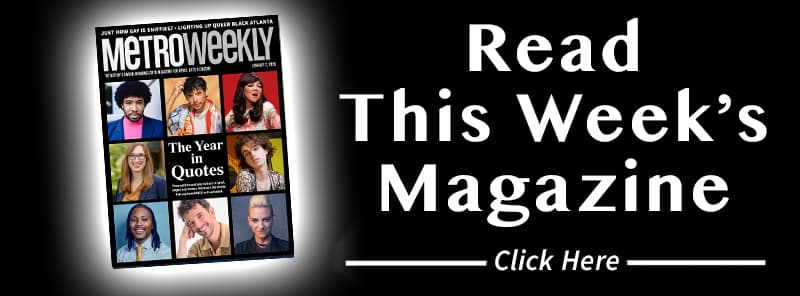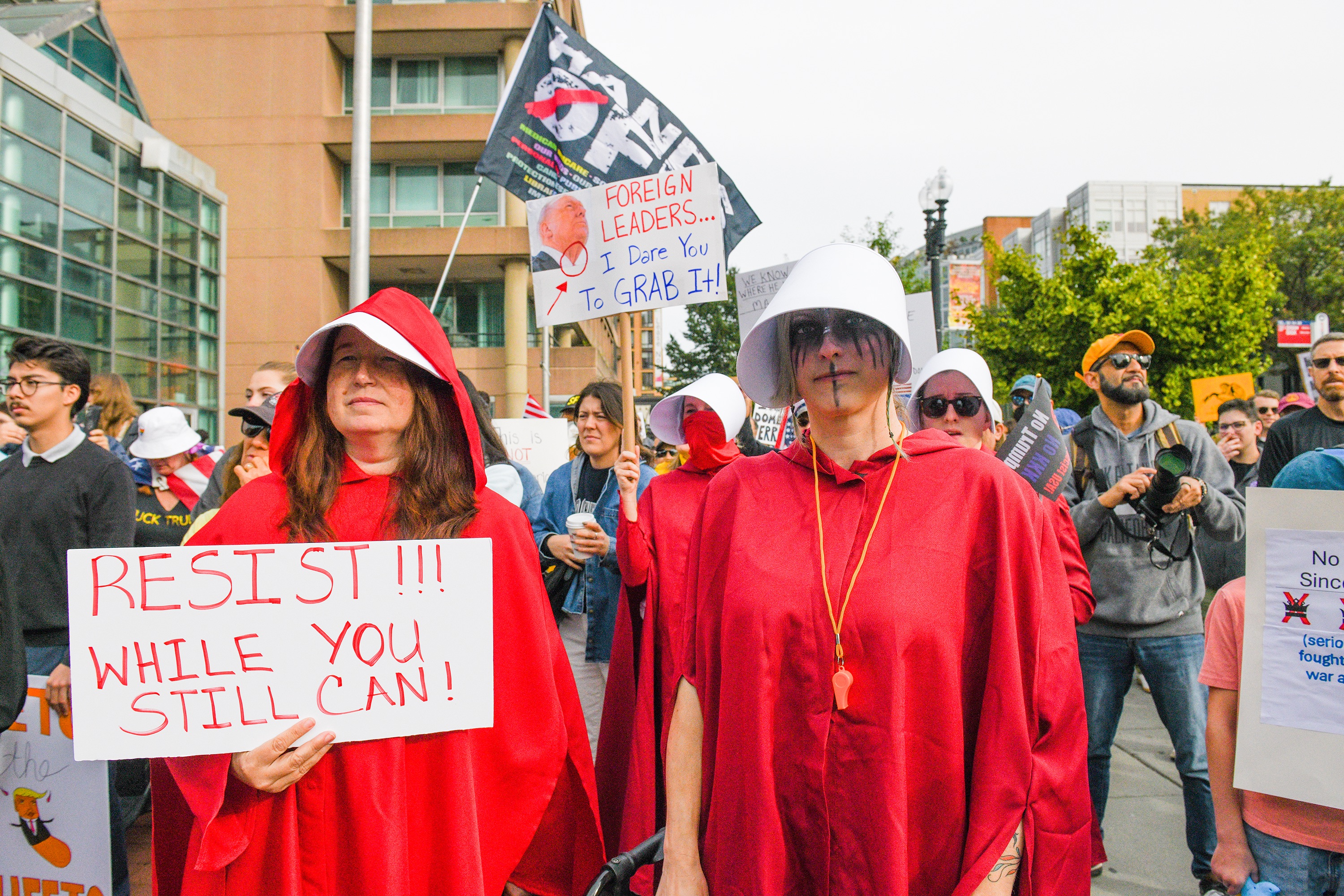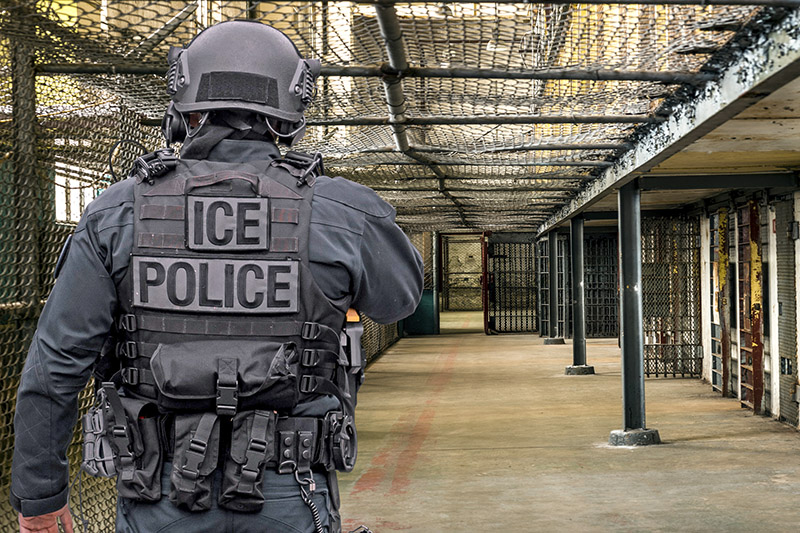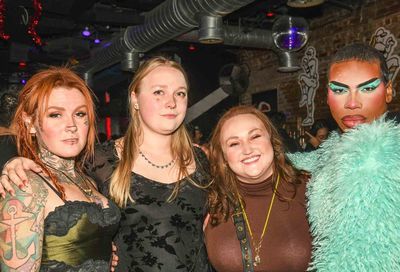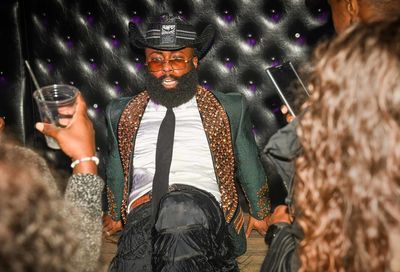Gay Is Good
How Frank Kameny changed the face of America
Frank Kameny’s life in the upper Northwest, Palisades corner of Washington looks quiet enough. The retiree lives in a modest home on a serene, tree-lined street. Characteristic of the home of an elderly man who has lost some of his vigor of yesteryear, the lawn may be in need of a mowing. A visit by a housekeeper wouldn’t be out of order. The scene looks perfectly humble and ordinary. But look a little closer. Is that a bong on the mantel?
”Oh, yes. I used that during testimony before the City Council,” Kameny offers, though he can’t recall the topic of his testimony. At 81, he has some trouble remembering some of the names or instances from of the past. These lapses are insignificant when compared to the tales Kameny easily recalls about a half-century of fighting.

Frank Kameny Photo by Todd Franson |
In the 1940s, he fought Nazis. In the 1950s, he fought the U.S. Civil Service. He’s battled the Pentagon, the FBI, the medical establishment, the police, and so on. Generally, he wins. And when he’s won, so has the entire gay community. As one of the first gay Americans to refuse — very publicly — to be ashamed of his sexual orientation, Kameny has played a monumental role in changing the playing field in favor of gay people. Years before Stonewall, he was picketing in front of the White House. In 1971, he ran as an openly gay candidate for D.C.’s non-voting seat in Congress. He may not have won the election, but he raised the visibility of gay people immeasurably. He coined the phrase ”Gay is Good” in 1968, when the distance between homosexuality and shame was a very short trip.
This weekend, Kameny is receiving some much-earned due. On Friday, Oct. 6, there will be a ceremony recognizing Kameny, as an assortment of his collected papers is transferred to the archive at the Library of Congress. Then, on Oct. 7 in New York, he and lesbian activist Barbara Gittings will be the first recipients of the American Psychiatric Association’s John M. Fryer, M.D., Award, recognizing, in part, their battle against that body’s earlier homophobia. Later that night, back in Washington, the Human Rights Campaign — an organization whose predecessor he helped found — will present him with the National Capital Area Leadership Award.
Today, still a very active member of the Gay and Lesbian Activists Alliance of Washington, D.C. — though his slight frame and grandfatherly smile might fool you — he is one of city’s, and the gay movement’s, proudest monuments.
METRO WEEKLY: In World War II, you enlisted just a few days shy of your 18th birthday.
FRANK KAMENY: May 18, 1943. My birthday is May 21. They actually got around to calling me into active duty on Sept. 20. Everybody was going in. It was a war that was universally supported, unlike the very contentious Vietnam conflict or what the current one in Iraq has become.
MW: One gets the impression that you are sort of ”scrappy.” Was that the mindset you went into the war with?
KAMENY: No. Actually, it was self-interest, somewhat. There was a program called the Army Specialized Training Program. After your basic training, you were sent to a college or university to be trained in engineering. You had to enlist to get into it, so I did. Then in January or February of 1944, Congress canceled the whole program. So one day I was living in comfort with a couple of other soldiers at the University of Illinois, and three days later, after a long train ride, I was in a tent in a sodden field in Camp Polk, La.
MW: So the government has a history of pulling the rug out from under you. From Camp Polk, you were sent to the European theater?
KAMENY: We set sail the day before the 1944 presidential election. I ended up as an 81mm-mortar crewman in an armored infantry battalion in the Eighth Armored Division. We ran into combat in Holland and then in the Rhineland. We were halfway across Germany when the war finally ended in May 1945. I finally came home in March of ’46.
MW: How did the war influence you? Did you come back ”war-hardened”?
KAMENY: I don’t know that it had that kind of impact. There were many intervals when I didn’t think I would be alive more than a few seconds. You learned to distinguish between the artillery shells that might get you and the ones that don’t get you. The sound is different. You learn that very, very quickly.
When I enlisted, I was asked whether I had homosexual tendencies. I did, and I was well aware of them. As a healthy, vigorous 17- or 18-year-old, things had gone somewhat beyond mere tendencies. And I lied, as everyone did on this subject in those days. But I’ve resented for 63 years that I had to lie in order to serve.
MW: Some people say that war makes strange bedfellows. Did you see any evidence of homosexuality among the ranks?
KAMENY: There were a number of passes made at me, which I didn’t recognize as such. In all the decades since, I’ve regretted that I didn’t. [Laughs.] There was an experience at one point in Germany, an encounter, if you want to use that word, which was overtly sexual. He came from New Hampshire. It was done very quietly in a garden behind a house, a block or so up the street from the house where we were staying. I think other people knew what his tendencies were. It wasn’t much talked about and I certainly wasn’t going to explore the full situation. It was a one-time experience and that was pretty much it. That was the only actual gay experience I had in the military.
MW: Was the war your primary motivation for your involvement with the Tomb of the Unknown Soldier here?
KAMENY: No, no, no, no, there’s no connection. A gay activist in Florida came up [to D.C.] probably in 1979 and wanted to lay a wreath at the Tomb of the Unknowns. There are procedures you go through, and he didn’t. He simply appeared with the wreath and sort of expected to walk up and put the wreath down, and he was stopped. It got me a little bit roused, so I then appealed and proceeded to make arrangements to lay a wreath and was turned down. Eventually we had to take [the military] to court. At that point, they backed off and we had our first wreath laying on Memorial Day in 1980.
MW: Coming back from the war to the States, when did you start to develop a gay identity?
KAMENY: I was discharged and I went back to college that September. I graduated mid-year, January 1948, and went to Harvard for my graduate work in astronomy. My Master’s and Ph.D. are in astronomy from Harvard. And I dated heterosexually somewhat.
Then the American Astronomical Society had a meeting in Boulder in 1953 [where] I met the director of the observatory of the University of Arizona in Tucson, and I made arrangements with him to go down there. On my 29th birthday, May 21, 1954, I received a seduction from a young man of 17, who had had more experience than I had. I spent sort of what I’ve always called ”a golden summer” with him. That’s when I first heard the word ”gay.” I had never heard it before. There was a gay bar in town and he told me where it was, and I went. It was my first actual introduction, if you want to use that word, to the gay community — my coming out.
MW: Did you embrace the identity immediately?
KAMENY: Oh, yes, I had no problem with that. I left there at the end of the year in ’54 and like all graduate students everywhere, you reach a point sometime when you have to get a job. I got a job at an observatory in Northern Ireland. I spent a year there, and I assiduously found other gay people. I became sort of known throughout much of Northern Ireland as the ”gay American.” I used to go into Belfast, where there was a gay bar. I became part of a very, very, very covert, hidden gay community. Keep in mind the gay movement in [America] was only five years old at that point.
MW: What are you using as a starting point?
KAMENY: Harry Hay [founding the Mattachine Society] in 1950. That was the start of the gay movement with continuity in this country.
In October 1955, I came back to the United States, to Cambridge, and finished up my Ph.D. By that time, I knew my way around. There was a gay bar scene in Boston and Cambridge, cruising places, things like that, which I became very much involved with. Then I got a job at Georgetown University. I got my Ph.D. in June of ’56 and moved to Washington. I’ve been here ever since.
MW: What sort of gay community did you find here?
KAMENY: Things were beginning to open up somewhat — a little, not terribly much. There was Carroll’s on Ninth Street, and Nob Hill, and the Redskin Lounge, which was on L Street. Oh, and of course, the one on H and 18th, the Chicken Hut. Others came along gradually. It was a very small, limited scene.
 Frank Kameny at 2009 DC Pride Parade |
MW: Were you fairly well integrated into it?
KAMENY: Oh, yes, yes, yes. I used to go out with very great frequency. Almost every night.
MW: What were these spots like?
KAMENY: In those days, as a matter of legal technicalities, there was no such thing as a bar. There were restaurants that had liquor licenses — they all had to have a functional kitchen. And since one normally goes to a restaurant and sits down to eat, you had to be seated to be served. You could not move from one table or booth to another. The waiter or waitress had to move you. That began to loosen up very slightly as the ’60s progressed.
But to jump ahead of the story a little bit, our police department was significantly larger than it is now, and there was a proposal to expand it. And in those days, the ”morals division,” so called, was out to entrap gay people. So I wrote a letter to the police department and said that simply, as a private citizen, as long as they were going to waste the police personnel they already had on hounding and harassing homosexuals, I was not going to see my tax money used to increase the size of the department. I got a phone call from Chief Roy E. Blick, who was head of the morals division, inviting me over to meet with him. He was very preemptory and he said, ”Come over to my office at 2 in the afternoon.” It was just before Thanksgiving in 1959 and I wasn’t about to take orders from him, so even though I could have done it very conveniently, I told him I couldn’t, but that I could do it at 2 the following Tuesday. I went over there and we had an interesting conversation. One of the things that came out of that was that they would not have any objections to same-sex pairs — males dancing with males in a bar — as long as, to use his own quote, ”nothing vulgar took place.” By which he meant mutual groping. So I passed that on to one of the bars and the management was not terribly receptive. But a year or so later, in ’61 or ’62, [Chicken Hut] began to have gay dances.
MW: This was also around the time of your firing from the Army Map Service for being gay?
KAMENY: Yes, I [was fired] from the Army Map Service in December 1957. To my knowledge, I was the first person to appeal one of these firings. The ACLU took my case, and we lost at the lowest level of the Court of Appeals. [The ACLU attorney] felt that the Supreme Court wouldn’t take it, but I tend to follow avenues to their conclusions. So he gave me a copy of someone else’s petition to the court to serve as a model. I wrote my own petition, which to my knowledge was the first gay-rights legal brief ever filed anywhere. I set out all my ideas of gays as a minority group. I had in mind that The Kinsey Report was the authoritative source of information in those days. And if you were going to define gays as a minority, you had to tell them how big a minority. I created the 10 percent figure for that brief. The Kinsey Report indicated a figure of 13.7 percent. I decided that 10 percent was a nice round figure that was probably not far from the truth and is conservative — probably a bit below the truth. It was filed near the end of January 1961. The Supreme Court turned it down at the end of March of ’61.
That ended my own personal case, but here was a genuine issue. Something needed to be done. That got me moving. I consulted Mattachine of New York. We had a preliminary meeting with them here at the Hay-Adams Hotel in August or September of ’61. I founded the [local] Mattachine Society on Nov. 15, 1961. We were an independent organization.
MW: Let’s go back to your being fired from the Army Map Service. You were arrested at one point?
KAMENY: Let’s get the whole sequence. [Around 1955], there was a meeting of the American Astronomical Society in San Francisco, which I attended. At that point, I was so very, very new to the whole gay scene. I didn’t know what to watch out for. I had taken a bus into San Francisco. At the bus terminal, I went to the men’s room. Someone was standing right next to me and it was one of these standard men’s room scenes. There was physical contact, to a limited degree. And there was a two-way mirror with a room behind it. There were some policemen in there, and I was arrested.
There was a procedure where you could have the case expunged, so I went through the whole procedure, paid the fine and that was about it.
MW: Did you have any idea they were putting two-way mirrors in men’s restrooms?
KAMENY: Oh, yes. Haven’t you ever heard the story here in Washington? When I came to Washington, Lafayette Park was the prime, outdoor cruising spot in this city. There was a men’s room on the H Street side. There was a two-way mirror that served very nicely as a mirror if you wanted to look into it. If you weren’t in the know, you never thought of it one way or another. So one day — this has become a classic story among people who know me — I went in there and measured the mirror’s wooden frame. I got a piece of plywood and pre-nailed it, then went back with the plywood and hammer and covered the mirror. Bang, bang, bang, it was done. I don’t know how long it stayed there, but for a while that mirror wasn’t functional anymore.
Anyway, when I filled out my application for the Army Map Service, they asked about arrests. Since I had a ”letter of expungement” from San Francisco as to my arrest, I answered the question with what I assumed was consistency. But they interpreted the question as meaning regardless of what the ultimate outcome was. If they ask you about an arrest, you have to put it down.
That autumn, I was out in Hawaii with a program to monitor an observation station. They phoned me from Washington and said, ”Come back, they want to investigate you.” I said, ”The government sent me out here at a lot of taxpayers’ expense. I will come back when I have finished this tour. You can tell the investigators to just sit there and wait.” I refused to come back until I finished everything. Then they called me and said they had information that ”leads us to believe you are a homosexual.” And I said, ”What’s the information?” They said, ”We can’t tell you.” And I said, ”Well, then, I’m not going to give you an answer. In any case, it’s irrelevant. It has no bearing on any valid governmental purpose, anyhow.”
That’s when things went into silence for about a month, after they asked me to resign and I didn’t. Ultimately, I was dismissed and I proceeded to appeal.
MW: Why weren’t you intimidated?
KAMENY: Because I’m right and they’re wrong — that’s been my underlying premise my whole life. Over the years and the issues I’ve taken on, I have not sought to adjust myself to society. I have adjusted society to me and society is much better off for the adjustments I’ve administered.
MW: Do you imagine that if you had been born heterosexual you would still be demanding that the world change itself to accommodate you?
KAMENY: I don’t think it would have been necessary. If I’d been born heterosexual, I would have gotten married and had a family and at this point been a retired, very successful astronomer and that would have been that.
MW: Would it have been a better life?
KAMENY: It’s hard to say. It probably would have been a duller life. [Laughs.] Leaving aside my never-ending financial problems, I’m really very well satisfied with where things have gone. I feel that the world and the lives of lots of individuals are better off for my having been around, and that’s very satisfying.

Frank Kameny on cover of Metro Weekly Photo by Todd Franson |
MW: Despite your early activism, despite Harry Hay, the Stonewall Riot of June 1969 is often pointed to as the starting point of the gay civil-rights struggle.
KAMENY: I strongly supported [the Stonewall riots]. I was very glad to see that it happened. In those days and for a very long time thereafter, the actual existence of a gay bar in the state of New York was illegal. A place in which homosexuals gathered was, by law, forbidden. I was familiar with the raids that had gone on and things of that kind. The whole cultural protest in all sorts of areas had escalated as the ’60s went on. Keep in mind, when we started picketing in ’65, a picket line was the expression of dissent par excellence. By the time you got into the late ’60’s, things had advanced very considerably.
MW: The picket lines you were organizing in 1965 were not going to offend anyone’s sensibility necessarily, beyond the message on the placards, unlike Stonewall.
KAMENY: Things were much more conservative. For example, in ’65, when it came to dress we didn’t have to concern ourselves with the color of shirts men wore, because there were only white shirts for men in those days. By the time we got to ’69 or ’70, things had moved significantly.
MW: And your sensibilities had changed?
KAMENY: Yes, of course. The gay movement began to change. We had the Gay Liberation Front, which was short lived. The Gay Activists Alliance in New York took the real lead in the movement. In a quieter way, we were really doing the work down here and getting things done.
When I got involved, going back to ’61, there were five or six gay organizations in the country. At the time of Stonewall, there were 50 or 60 gay organizations. The best count by 1970, there were 1,500 gay organizations. A year after that, the best count, there were 2,500 and people stopped counting. So there was a very real change.
MW: Coming sort of full circle, we’re just a few days from a new string of honors for you. The Library of Congress event, Friday, Oct. 6, is up first. What is that event about?
KAMENY: I’m a packrat. I never throw anything away. I have boxes and boxes of papers of various kinds up in my attic — lots more in the bedroom upstairs, which I have converted into an office. It’s so crammed full of papers, there’s hardly room for me.
Do you know [Kameny Papers Project volunteer coordinator] Charles Francis? He has made the complex arrangements for pulling and, in effect, purchasing the papers and transmitting them to the Library of Congress. I had all the picket signs from the 1960 pickets up in my attic, and from my congressional campaign.
There will be some sort of formal ceremony at noon on the 6th. The moment I leave that, I go to a VIP reception by HRC at the Convention Center. Then I take a late-night train to New York and receive an award, along with [lesbian activist] Barbara Gittings, from the American Psychiatric Association. Either I can stay on for a reception in New York and then come home, or take the train and rush back for an award from HRC at their banquet that evening. I will then come home and collapse until Thanksgiving.
MW: Is your correspondence with the FBI a big part of the papers going to the Library of Congress?
KAMENY: Not that much. There was one little interesting episode with the FBI. Back in the middle ’60s, Mattachine of Washington had a publication called The Gazette. We felt that since one of our primary issues was the government-employment issue we should send copies to some of the members of Congress, the Supreme Court and the local Court of Appeals, the chair of the Civil Service Commission, the president and vice-president, and [FBI Director] J. Edgar Hoover. In August of ’64, I got a call from an agent of the FBI and he wanted to come over to talk to me. I, on principle, wasn’t about to have FBI agents in my house. We arranged that I and the Gazette editor would go over to meet with him. He said Mr. Hoover wanted to be taken off our mailing list.
Going in with a great deal of trepidation, we had come out realizing, with a great deal of amusement, that many members of the Mattachine Society were concerned lest they be on lists maintained by the FBI, and the FBI was even more concerned that they were on lists maintained by the Mattachine Society.
MW: Though you’ve got this busy period coming, how do you usually spend your days as a retiree?
KAMENY: I don’t have the energy level I once did. I really used to be very efficient and got things done. Now I don’t and it just infuriates me. I doze in ways I never did. But I read three newspapers a day: The New York Times, The Washington Post and The Washington Times.
Until about two years ago, I used to keep up with my front and back lawns. That has now gotten beyond me. There isn’t the stamina physically. When you’re 81, things creep in on you. So I appealed and Burgundy Crescent Volunteers came and cleaned up the place. It needs another mowing now, but they did a magnificent job. That helped out enormously.
I also keep up with what I call the ”nutty fundamentalists.” I monitor them. I listen to radio station WAVA. I would be listening to it now if you weren’t here. A number of their people know me very well. I’m referring to them now — as the term ”Islamofascist” was coined recently — as the ”Christianofascists.” They’re trying to create a theocracy here. If they thought they could get away with executing gays the way they do in the Middle East, they would do it as soon as they could. Just as they used to burn heretics at the stake in the Middle Ages.
MW: In the tales of your life, there doesn’t seem to have been any romantic partner, or similar long-term interest. Was there?
KAMENY: No. That’s not been part of my own structure. I’ve always approached these things on the basis that ”variety is the spice of life,” in sexual matters as much as in food. I wouldn’t eat from the same menu, three meals a day, seven days a week, 365 days a year. And I’m not about to do that with a relationship.
There have been close friends and people that I’ve seen on a long-time repetitive basis over the years. Yes, there were a number of more-than-one-time relationships — with some that were more than casual — but no quasi-marital equivalent. That’s been fine with me.
MW: What do you think of the generation of leadership that’s coming after you?
KAMENY: There’s no easy answer to that because the movement is so huge and varied and diverse. If you were asking exactly that same question 45 years ago, you could name them all on the fingers of one hand, certainly not more than two hands. I’d say he’s doing a wonderful job, she’s doing a dreadful job and go right down the list, and in three minutes we’d be done. You can’t do that anymore.
MW: As a community, have we arrived?
KAMENY: We certainly have come further than we ever could have dreamed. And I don’t think anybody could have ever imagined where we’d be.
MW: Including yourself?
KAMENY: I simply didn’t expect to see where we’re at. But it has increasingly elicited a backlash from the conservatives. They are rigidly and nastily anti-gay. I always find it very useful in arguing with them to wrap myself in the American flag and say that as a gay veteran of World War II combat I didn’t come back here for second-class citizenship. They are fighting for all they’re worth. Ultimately, I think we’ll win because we’re right and they’re wrong. But it’s going to take awhile. There is still a good deal of a fight ahead of us for the coming years. The battle is not over, but at this point we have a good, solid base.
Support Metro Weekly’s Journalism
These are challenging times for news organizations. And yet it’s crucial we stay active and provide vital resources and information to both our local readers and the world. So won’t you please take a moment and consider supporting Metro Weekly with a membership? For as little as $5 a month, you can help ensure Metro Weekly magazine and MetroWeekly.com remain free, viable resources as we provide the best, most diverse, culturally-resonant LGBTQ coverage in both the D.C. region and around the world. Memberships come with exclusive perks and discounts, your own personal digital delivery of each week’s magazine (and an archive), access to our Member's Lounge when it launches this fall, and exclusive members-only items like Metro Weekly Membership Mugs and Tote Bags! Check out all our membership levels here and please join us today!







